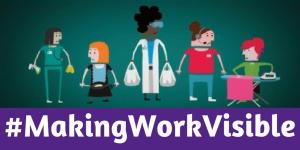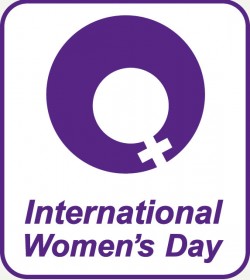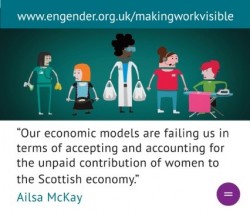Engender blog
#MakingWorkVisible as it happened on #IWD2017
A snapshot of the day as we launched #MakingWorkVisible
Help us to make women's work visible this International Women's Day

This International Women's Day, Engender will be charting the work done by women across Scotland.
By work, we mean much more than the paid labour which most economists count as 'work'. We know much of the work done by women - caring, looking after households, making sure everyone is supported - is often invisible in society. We also know that without this work, the work done by others would not happen (find out more about these issues here.)
International Women's Day - Let's #makeworkvisible
Happy International Women's Day!
Not a lot of people know that International Women's Day used to be calling International Working Women's Day.

But what does being a working woman actually mean? Governments and international bodies tend to recognise work as something you get paid for. You offer your services, skills and time, and your receive a wage for it. This wage then gets spent on rent, bills, food and goods, and paying other people for services, and so the economy functions. This is what's known as the 'formal economy'. Things which are deemed not to contribute to the formal economy are normally counted as 'leisure'.
There are huge problems with the formal economy for women – we still (in 2015!) have a pay gap which means women earn 13% less than men as full time workers and 32% less than men part-time. Women are more likely to be in precarious and low paid positions. We are less likely to become CEO (in fact, if you're a man named John, James, William or Robert you're more likely to be CEO than a woman!) and are still discriminated against in the workplace.

But perhaps the biggest problem with the 'formal economy' is that it doesn't recognise the value (economic or otherwise) of any work which doesn't fit into that rigid pattern of work-earn-spend. Work such as raising children, caring for relatives, housework and contributing to communities are not counted in budgets and figures such as GDP (Gross Domestic Product – the way which most governments measure economic activity), even though they clearly contribute to the wellbeing of the country. This sort of work is still predominantly done by women – 62% of unpaid care-givers are women, the majority of childcare is still undertaken by women, and the time men spend doing housework has only increased at a rate of one minute per day per year since the '70s!
Watch our brilliant new film 'Marginal-eyes' which highlights the problem of undervalued and unseen women's work!
Please help us spread the word about this important issue on Twitter and Facebook using the hashtag #makeworkvisible. We also have graphics highlighting the issue which can be found on our our Flickr page.
Downloads
 Engender Briefing: Pension Credit Entitlement Changes
From 15 May 2019, new changes will be introduced which will require couples where one partner has reached state pension age and one has not (‘mixed age couples’) to claim universal credit (UC) instead of Pension Credit.
Engender Briefing: Pension Credit Entitlement Changes
From 15 May 2019, new changes will be introduced which will require couples where one partner has reached state pension age and one has not (‘mixed age couples’) to claim universal credit (UC) instead of Pension Credit.
 Engender Parliamentary Briefing: Condemnation of Misogyny, Racism, Harassment and Sexism
Engender welcomes this Scottish Parliament Debate on Condemnation of Misogyny, Racism, Harassment and Sexism and the opportunity to raise awareness of the ways in which women in Scotland’s inequality contributes to gender-based violence.
Engender Parliamentary Briefing: Condemnation of Misogyny, Racism, Harassment and Sexism
Engender welcomes this Scottish Parliament Debate on Condemnation of Misogyny, Racism, Harassment and Sexism and the opportunity to raise awareness of the ways in which women in Scotland’s inequality contributes to gender-based violence.
 Gender Matters in Social Security: Individual Payments of Universal Credit
A paper calling on the Scottish Government to automatically split payments of Universal Credit between couples, once this power is devolved to the Scottish Parliament.
Gender Matters in Social Security: Individual Payments of Universal Credit
A paper calling on the Scottish Government to automatically split payments of Universal Credit between couples, once this power is devolved to the Scottish Parliament.
 Gender Matters Manifesto: Twenty for 2016
This manifesto sets out measures that, with political will, can be taken over the next parliamentary term in pursuit of these goals.
Gender Matters Manifesto: Twenty for 2016
This manifesto sets out measures that, with political will, can be taken over the next parliamentary term in pursuit of these goals.
 Scottish NGO Briefing for UN Special Rapporteur on Violence Against Women
Joint briefing paper for the UN Rapporteur on Violence Against Women.
Scottish NGO Briefing for UN Special Rapporteur on Violence Against Women
Joint briefing paper for the UN Rapporteur on Violence Against Women.

Newsletter
Sign up to receive our newsletter here:
Sign up to our mailing list
Receive key feminist updates direct to your inbox: